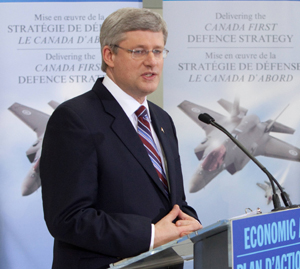The May 2 election was always about two things: will the Conservatives win a majority, and will the NDP make major breakthroughs in Quebec? The answer on both counts, as it turns out, is a resounding yes.
What will a Conservative majority look like? What does it mean for Stephen Harper’s crime agenda, for the Supreme Court, for social programming? Some thoughts from Xtra.
When Harper took to the stage in Calgary to give his victory speech, his tone was jubilant, but his words were measured. He avoided some of the eye-poking partisan barbs he’s capable of, saying simply, “What a great night,” and “Canada can now turn the page.”
“For our part, we can and must be aware that we are the government for all Canadians, even those who did not vote for us,” Harper said, perhaps in reference to his party’s dismal showing in Quebec.
Even so, he renewed his pledge to “promptly deliver” on his campaign promises, including his crime omnibus.
“At long last,” he said, “we will pass our plan to make our streets and neighbourhoods safer.“
There were many surprises over the course of the night. Perhaps the most striking was the Conservative gain in Toronto, unseating prominent Liberals like Ken Dryden, Rob Oliphant and even Liberal Party Leader Michael Ignatieff. The NDP also picked up a handful of Toronto ridings south of Bloor and will be sending Andrew Cash (Davenport), Peggy Nash (Parkdale-High Park), Matthew Kellway (Beaches-East York) and Dan Harris (Scarborough-Southwest) to Ottawa in addition to Jack Layton and Olivia Chow.
At the dissolution of Parliament, there were five openly gay MPs: NDPers Bill Siksay and Libby Davies and Liberals Scott Brison, Mario Silva and Rob Oliphant. Siksay retired and Silva and Oliphant have lost their seats.
Davies and Brison were reelected. They will be joined by at least two NDP rookies — Dany Morin (Chicoutimi) and Phil Toone (Gaspésie-Îles-de-la-Madeleine). One more — Randall Garrison in BC — is locked in a tight race at this hour and it’s too close to call.


 Why you can trust Xtra
Why you can trust Xtra


